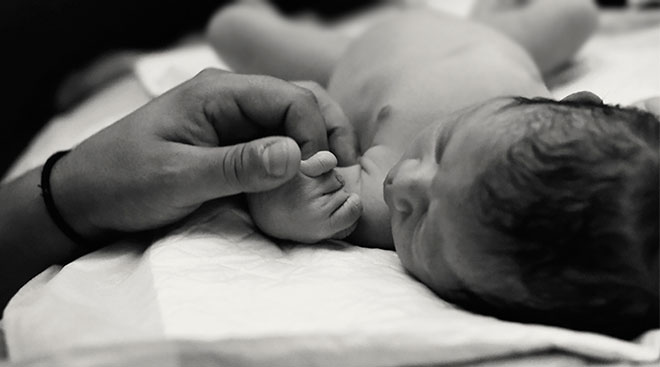What Is a Midwife?
If you’ve just found out you’re expecting, congratulations! You’ll have tons of decisions to make over the next nine+ months, but one of the most important is whether you’ll opt for an ob-gyn or a midwife for your prenatal care and eventual delivery. Most women are pretty familiar with the type of care to expect at the OB’s office. But what is a midwife? What does a midwife do? And is a midwife a doctor?
We’re answering all your questions and sharing everything you need to know before choosing a midwife for prenatal care and childbirth. Read on for the benefits, drawbacks and important considerations to keep top of mind.
You probably know that some women opt for a midwife instead of an ob-gyn, but you might not realize why. So, first and foremost, let’s address: What is a midwife? Many women tend to think of midwives as playing a supporting role in the pregnancy and childbirth experience, similar to doulas or lactation consultants. But a midwife is, in fact, a professional trained specifically in assisting women with every aspect of pregnancy, from prenatal care to delivery. What’s more, their job doesn’t necessarily end there. So what does a midwife do beyond labor and delivery? Keep reading.
What does a midwife do?
You can see your midwife for just about all your women’s health needs, including your annual exam, contraceptive counseling and prescriptions. Most importantly, a midwife helps a woman achieve a satisfying birth experience and provides support during labor and birth to attain this goal. Sarita Bennett, DO, CPM, president of Midwives Alliance of North America, says, “It is more of a shared decision-making model with the provider educating and supporting, while the client has the ultimate control over what happens to her and her baby.” Midwives often lend a more personal touch to the pregnancy experience compared to OBs, emphasizing the physical, emotional and social needs of patients.
There are many types of midwives, all with different levels and types of education. Here’s a quick summary—though it’s worth noting that different states may have different sets of regulations for each type of midwife.
• Nurse-midwife (CNM): A certified nurse-midwife is a registered nurse who has topped off her nursing degree with a graduate-level nurse-midwife degree program, which includes a combination of training in obstetrics and gynecology and midwifery; a nurse-midwife has also passed an exam administered by the American Midwifery Certification Board.
• Certified Midwife (CM): A certified midwife is a non-nurse who has taken a graduate-level midwifery degree program and also passed the certification exam.
• Certified Professional Midwife (CPM): A certified professional midwife is a midwife who has met the certification requirements of the North American Registry of Midwives.
• Direct-Entry Midwife (DEM): A DEM can be a CNM, CM or CPM; this term describes midwives specializing in home and birthing-center births.
• Lay Midwife: Lay midwives have informal training, such as an apprenticeship. They are not considered medical professionals.
Who you choose to deliver your baby and where is in many ways up to you—whether it’s a certain type of midwife, an OB or a combination of the two. “It’s another take along the theme of reproductive choice,” points out Jaime Knopman, MD, a New York City-based reproductive endocrinologist.
There are many benefits to choosing a midwife, assuming that the mom-to-be is healthy and has an uncomplicated birth. In these low-risk cases, Bennett says, “midwifery care results in fewer c-sections, fewer interventions, more successful breastfeeding and, overall, more families who are less likely to be traumatized by their care.”
According to the American College of Nurse-Midwives, women would typically find that they have a greater sense of control with a nurse-midwife-assisted labor and birth. Midwives, in general, end up using fewer technological or medical interventions than an OB, but they’re also able to recognize possible complications and bring in the help of an OB when necessary.
Chances are, you can find a midwife to assist you wherever you choose to deliver. According to the American College of Nurse Midwives, in 2019, about 8 percent of births attended by a midwife took place in a home. The benefits of giving birth at home are clear: You’ll deliver in a familiar setting, surrounded by whomever you choose, with no medical intervention. However, there can also be serious risks: Complications or emergencies that arise cannot be immediately treated, and pain relief is not available, even if you change your mind at the last minute.
Birthing centers offer flexible, comfortable settings with fewer rules and regulations than hospitals. For instance, continuous fetal monitoring is generally not practiced in birthing centers. Moms are allowed to get up, walk around and explore different laboring positions. Birthing centers also often allow more family members to attend the birth than a hospital would.
Many midwives in the United States, however, practice within a hospital system. Here, women can get the best of both worlds: the experience of a midwife-assisted birth along with the reassurance of a medical setting, should it become necessary.
As you’ve likely gathered by now, a midwife is not a doctor. So what does a midwife do—and what limitations do they face? While they are highly trained in prenatal care and labor and delivery techniques, there are some circumstances that warrant a medical doctor. To that end, it’s important to note that not all women are good candidates for midwifery care. The conventional route works best for those with high-risk pregnancies. This might include, for instance, women who are age 35 or older or obese; or women who have preeclampsia, diabetes, hypertension, seizure disorders or other pre-existing medical conditions, explains Knopman.
“Midwives have to follow rules in the state that licenses them,” Bennett says. “Most don’t allow [midwives to handle] twins, breeches and sometimes VBACs (vaginal births after cesarean).” In those cases, using an OB (who has undergone four years of medical school in addition to four years of a residency program, plus a board-certification process) would be most prudent or, in fact, necessary.
But that doesn’t mean you can’t have a midwife attend your high-risk delivery alongside a physician. Often, in situations like these, midwives collaborate with physicians and provide comfort and support to the mother during delivery. If a woman in the care of a midwife runs into significant medical problems, the physician will step in. This often occurs when a c-section is necessary, since midwives aren’t able to perform surgery (but may be able to assist depending on their training). This is the most notable difference between a midwife and an ob-gyn.
What to consider before choosing a midwife
Now that you know more about what a midwife does and doesn’t do, you might be starting to weigh your options. While it’s certainly a personal decision, there are some key factors you’ll want to consider.
Risk profile: Is your pregnancy considered low-risk? Midwives are a great addition to uncomplicated births. Do you have a pre-existing condition, or are you 35 or older? An ob-gyn might be the safer bet for your prenatal care. Moreover, if there’s an increased chance you may need a c-section, you’ll want to have an OB in your corner. Remember that, while a midwife can provide some level of support, a doctor will ultimately need to perform the surgery and deliver your baby.
Birth experience: Do you want a water birth? Are you passionate about pursuing an unmedicated birth? Are you set on delivering baby at home? Midwives can often accommodate these preferences.
Personalized care: Are you looking for someone to provide counseling and postnatal care? A midwife will see you through your entire pregnancy and beyond. While an ob-gyn will certainly provide followup, midwives often offer a more personalized approach—sometimes even counseling moms on newborn care and providing lactation services.
Do midwives only believe in medication-free births?
Some midwives may promote medication-free births, but that doesn’t mean you can’t choose for yourself. Most certified midwives are able to prescribe medications and order an epidural in a hospital setting (an anesthesiologist or nurse anaesthetist will actually administer it). But if you’re even flirting with the idea of an epidural, it’s probably best to deliver at a hospital, regardless of whether you use an ob-gyn or a midwife.
Wondering how a doula differs from a midwife? According to DONA International, the certification board for doulas, a doula is “a trained professional who provides continuous physical, emotional and informational support to a mother before, during and shortly after childbirth to help her achieve the healthiest, most satisfying experience possible.” In short, doulas act as birth coaches, supporting the mother and helping her labor and delivery go as smoothly as possible, similar to a midwife. But the biggest difference between a doula vs. midwife is that a midwife is a trained healthcare professional who provides care for Mom and baby throughout pregnancy as well as labor and delivery, while a doula is a non-healthcare professional who provides comfort and assistance where necessary.
Everyone had unique needs. You’ll want to interview some midwives to find the right fit for you. Ask lots of questions and do your due diligence; research their credentials and training, check that they’re affiliated with an ob-gyn (in the event of a medical emergency) and make sure you feel comfortable in their presence. You want your childbirth to be a positive experience, so don’t settle.
All things considered, delivering with a midwife will likely be less expensive than delivering with an OB, regardless of the setting. That’s because midwives charge less for their services than OBs do. Costs vary greatly depending on where you live and your birth situation, says Ashley West, a spokesperson for the American College of Nurse-Midwives.
When it comes to figuring out whether your midwife’s services will be covered by insurance, things can get a bit murky, especially when you factor in where you’d like to give birth. Most insurance plans will cover the cost of a midwife in a hospital setting. However, if you opt for a home birth with the assistance of a midwife, the midwife’s fee may be an out-of-pocket expense. Many insurance companies won’t cover home births, because they consider home births too risky. However, midwives often offer payment plans and sliding fees, and are willing to accept most insurance plans, including Medicaid. Be sure to contact your insurance company as early as possible in your pregnancy to get the answers you need.
Midwives provide women with comfort, support and care before, during and after childbirth. They can help moms feel empowered in their experience and informed in their decision-making. Before choosing a midwife, talk to your current doctor about your preferences and your risk profile; it’s not the right path for everyone. But if you want an approach that feels less clinical and more holistic, a midwife might be the answer for you.
Plus more from The Bump:
Please note: The Bump and the materials and information it contains are not intended to, and do not constitute, medical or other health advice or diagnosis and should not be used as such. You should always consult with a qualified physician or health professional about your specific circumstances.
Sarita Bennett, DO, CPM, is president of the Midwives Alliance of North America. She received her medical degree from the West Virginia School of Osteopathic Medicine in Lewisburg, West Virginia.
Jaime Knopman, MD, is a reproductive endocrinologist and the director of fertility at CCRM Fertility in New York City. She earned her medical degree from Mount Sinai School of Medicine in New York City.
Ashley West is a communications specialist at the American College of Nurse-Midwives, a professional association that represents certified nurse-midwives and certified midwives in the US.
American College of Nurse Midwives, Essential Facts About Midwives, June 2021
DONA International, What is a Doula?
Learn how we ensure the accuracy of our content through our editorial and medical review process.
Navigate forward to interact with the calendar and select a date. Press the question mark key to get the keyboard shortcuts for changing dates.




















































